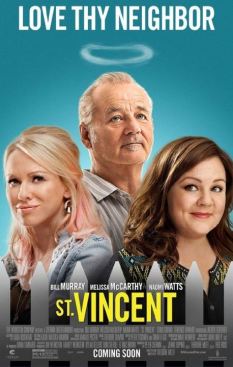
 St. Vincent (IMDB) is a well-intentioned comedy that is not as heart-warming as it thinks it is. However it is redeemed by some good performances, particularly a star turn by Bill Murray as a cantankerous old geezer with a heart of bronze.
St. Vincent (IMDB) is a well-intentioned comedy that is not as heart-warming as it thinks it is. However it is redeemed by some good performances, particularly a star turn by Bill Murray as a cantankerous old geezer with a heart of bronze.
Vincent MacKenna (Murray) is a grumpy old man who is not only rude but not particularly honest. He is also flat broke, which does not seem surprising given his constant drinking and gambling and his relationship with a pregnant stripper (Naomi Watts.)
His new neighbor Maggie Bronstein (Melissa McCarthy) is a newly-single mother and is desperate to find someone to watch her little boy Oliver (Jaeden Lieberher) after school. So she agrees to pay Vincent to watch him.
Vincent is not the sort of responsible person we would choose for such a task, but he and Oliver actually hit it off pretty well. Vincent becomes a kind of disreputable but worldly-wise uncle-figure and maybe that’s what Oliver needs right now.
Usually in a movie like this the innocent child would redeem the cantankerous old codger, inspiring him to reform. But that’s not what this movie has in mind. Instead it decides to show us that Vincent is fine the way he is and doesn’t need to change.
To explain why I don’t find this very convincing I’m going to have to include some spoilers, so if you are interested in watching this you may want to stop reading now.
Oliver attends a remarkably liberal and open-minded Catholic school and is assigned to prepare a big multimedia presentation on someone he knows whom he considers a saint. “Saint” is here liberally defined as someone who does good things for others at some cost to himself.
So he picks Vincent, who seems like the least-likely candidate. Nevertheless Oliver puts a lot of work into researching Vincent’s life and preparing the presentation. It is well-received and everyone seems convinced.
My immediate reaction was “if Vincent is a saint then just about everyone must be a saint.” And I think that’s the movie’s point: that everyone is a saint in some way if you know them well enough. And I sort of understand what they’re getting at; the problem is that just isn’t what most people mean when they use the word “saint.” If “saint” means the same thing as “person” then why do we even need the extra word?
The more I look at it the shakier the evidence for Vincent’s sainthood looks. The movie’s main revelation is that Vincent has been spending most of his money to keep his wife, who suffers from dementia, in a ritzy upscale nursing home. That’s all very well but I can’t help wondering whether she wouldn’t have been have been happier if he had kept her at home and hired a part-time health-care aide to help out. That would certainly have cost a lot less.
She obviously suffers from severe memory loss but in the few scenes in which she appears she seems pretty lucid. She doesn’t appear violent, abusive or out-of-control, things that might make institutionalization necessary. Nor is she hooked up to any fancy medical equipment.
I can’t help wondering whether the main problem was that taking care of her would have left Vincent with no time for his drinking, gambling and whoring. If so we know where his wife really stands in his list of priorities.
Believe my, I’m not trying to minimize the physical and emotional costs of taking care of a dying person. Not everyone is capable of doing that. My point is that if Vincent had done it I would be much more willing to think of him as a saint.

